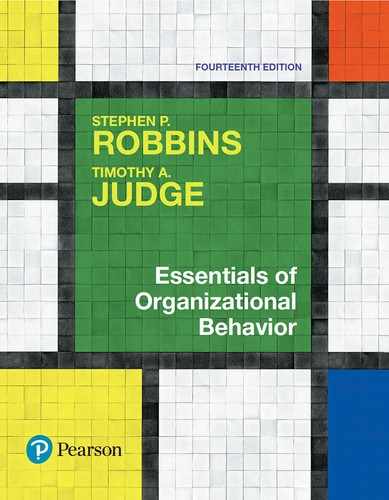 Implications for Managers
by Timothy A. Judge, Stephen P Robbins
Essentials of Organizational Behavior, 14/e
Implications for Managers
by Timothy A. Judge, Stephen P Robbins
Essentials of Organizational Behavior, 14/e
- Essentials of Organizational Behavior
- Brief Contents
- Contents
- Preface
- About the Authors
- Part 1 Understanding Yourself and Others
- 1 What Is Organizational Behavior?
- Improve Your Grade!
- Learning Objectives
- Management and Organizational Behavior
- Complementing Intuition with Systematic Study
- Disciplines That Contribute to the OB Field
- There are Few Absolutes in OB
- Challenges and Opportunities for OB
- Coming Attractions: Developing An OB Model
- Summary
- Implications for Managers
- 2 Diversity in Organizations
- 3 Attitudes and Job Satisfaction
- 4 Emotions and Moods
- 5 Personality and Values
- 1 What Is Organizational Behavior?
- Part 2 Making and Implementing Decisions
- 6 Perception and Individual Decision Making
- Improve Your Grade!
- Learning Objectives
- What is Perception?
- Person Perception: Making Judgments about Others
- The Link Between Perception and Individual Decision Making
- Decision Making in Organizations
- Influences on Decision Making: Individual Differences and Organizational Constraints
- What About Ethics in Decision Making?
- Creativity, Creative Decision Making, and Innovation in Organizations
- Summary
- Implications for Managers
- 7 Motivation Concepts
- Improve Your Grade!
- Learning Objectives
- Motivation
- Early Theories of Motivation
- Contemporary Theories of Motivation
- Other Contemporary Theories of Motivation
- Job Engagement
- Integrating Contemporary Theories of Motivation
- Summary
- Implications for Managers
- 8 Motivation: From Concepts to Applications
- Improve Your Grade!
- Learning Objectives
- Motivating by Job Design: The Job Characteristics Model (JCM)
- Using Job Redesign to Motivate Employees
- Using Alternative Work Arrangements to Motivate Employees
- Using Employee Involvement and Participation (EIP) to Motivate Employees
- Using Extrinsic Rewards to Motivate Employees
- Using Benefits to Motivate Employees
- Using Intrinsic Rewards to Motivate Employees
- Summary
- Implications for Managers
- 6 Perception and Individual Decision Making
- Part 3 Communicating in Groups and Teams
- 9 Foundations of Group Behavior
- Improve Your Grade!
- Learning Objectives
- Groups and Group Identity
- Stages of Group Development
- Group Property 1: Roles
- Group Property 2: Norms
- Group Property 3: Status, and Group Property 4: Size
- Group Property 5: Cohesiveness, and Group Property 6: Diversity
- Group Decision Making
- Summary
- Implications for Managers
- 10 Understanding Work Teams
- Improve Your Grade!
- Learning Objectives
- Why have Teams become so Popular?
- Differences between Groups and Teams
- Types of Teams
- Creating Effective Teams
- Turning Individuals into Team Players
- Beware! Teams Aren’t Always the Answer
- Summary
- Implications for Managers
- 11 Communication
- 9 Foundations of Group Behavior
- Part 4 Negotiating Power and Politics
- 12 Leadership
- Improve Your Grade!
- Learning Objectives
- Trait Theories of Leadership
- Behavioral Theories
- Contingency Theories
- Contemporary Theories of Leadership
- Responsible Leadership
- Positive Leadership
- Challenges to our Understanding of Leadership
- Summary
- Implications for Managers
- 13 Power and Politics
- Improve Your Grade!
- Learning Objectives
- Power and Leadership
- Bases of Power
- Dependence: The Key to Power
- Power Tactics
- How Power Affects People
- Politics: Power in Action
- Causes and Consequences of Political Behavior
- Summary
- Implications for Managers
- 14 Conflict and Negotiation
- Improve Your Grade!
- Learning Objectives
- A Definition of Conflict
- The Conflict Process
- Negotiation
- The Negotiation Process
- Individual Differences in Negotiation Effectiveness
- Negotiating in a Social Context
- Third-Party Negotiations
- Summary
- Implications for Managers
- 12 Leadership
- Part 5 Leading, Understanding, and Transforming the Organization System
- 15 Foundations of Organization Structure
- Improve Your Grade!
- Learning Objectives
- What is Organizational Structure?
- Common Organizational Frameworks and Structures
- Alternate Design Options
- The Leaner Organization: Downsizing
- Why Do Structures Differ?
- Organizational Designs and Employee Behavior
- Summary
- Implications for Managers
- 16 Organizational Culture
- Improve Your Grade!
- Learning Objectives
- What is Organizational Culture?
- What do Cultures do?
- Creating and Sustaining Culture
- How Employees Learn Culture
- Influencing an Organizational Culture
- The Global Context
- Summary
- Implications for Managers
- 17 Organizational Change and Stress Management
- 15 Foundations of Organization Structure
- Epilogue
- Endnotes
- Glossary
- Index
Implications for Managers
Effective teams have adequate resources, effective leadership, a climate of trust, and a performance evaluation and reward system that reflects team contributions. These teams have individuals with technical expertise, and the right traits and skills.
Effective teams tend to be small. They have members who fill role demands and who prefer to be part of a group.
Effective teams have members who believe in the team’s capabilities, are committed to a common plan and purpose, and have an accurate shared mental model of what it is to be accomplished.
Select individuals who have the interpersonal skills to be effective team players; provide training to develop teamwork skills; and reward individuals for cooperative efforts.
Do not assume that teams are always needed. When tasks will not benefit from interdependency, individuals may be the better choice.
 Try It!
Try It!
If your professor has assigned this, go to the Assignments section of mymanagementlab.com to complete the Simulation: Teams.
 Personal Inventory Assessments
Personal Inventory Assessments
Team Development Behaviors
Take this assessment to learn more about behavior in teams.
10-1. From your understanding of the chapter, list the characteristics of an optimally successful team.
-
No Comment